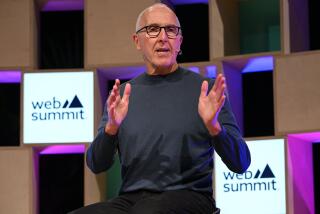Trump blesses TikTok deal with Oracle and Walmart. How will China respond?
President Trump approved the framework of a deal Saturday that would keep TikTok operating in the U.S. through a sale to Oracle and Walmart.
Under the deal, the company would become U.S.-based TikTok Global, which would provide the popular video app to most users worldwide. The new company would most likely be incorporated in Texas, Trump said, and would add 25,000 jobs in the U.S.
“We’ll see whether or not it all happens,” Trump said. “But conceptually, I think it’s a great deal for America.”
Oracle and Walmart said TikTok Global would be majority-owned by American investors, with four of five board seats held by Americans. TikTok’s China-based parent company, ByteDance, appears to retain partial ownership.
Within a year, TikTok Global would hold an initial public stock offering.
The financial terms of the deal are not yet clear.
ByteDance has been under pressure by the Trump administration to divest its U.S. operations by Nov. 12 or risk a ban.
Trump had signed an executive order that would require Apple and Google to remove TikTok from their app stores at midnight Sunday, restricting new downloads and updates of the app.
The president had expressed concern that TikTok’s parent company could be giving information on U.S. users of TikTok to the Chinese government.
TikTok said it has not shared U.S. user data with the Chinese government and that the company stores U.S. user data in Virginia and backs it up in Singapore.
After Trump’s comments Saturday, the Commerce Department said in a statement that it would delay until Sept. 27 enforcement of the executive order removing TikTok from U.S. app stores.
“We are pleased that the proposal by TikTok, Oracle, and Walmart will resolve the security concerns of the U.S. administration and settle questions around TikTok’s future in the U.S.,” TikTok said in a statement.
Under the deal, Oracle, which is based in the San Francisco Bay Area, would host TikTok’s U.S. user data and is working on a commercial partnership with Arkansas-based Walmart, TikTok said. The companies could take up to a 20% stake in TikTok in a pre-IPO financing round, TikTok said in a statement.
According to the Wall Street Journal, ByteDance would retain about 80% ownership in the spinoff — but because U.S. investors own about 40% of ByteDance, the new venture could be characterized as majority American-owned. Oracle said its ownership stake would be 12.5%; Walmart said it has tentatively agreed to buy 7.5% of TikTok Global.
WeChat will be banned in the U.S. and new downloads of and updates to TikTok will not be available starting Sunday, the Commerce Department said.
Treasury spokeswoman Monica Crowley said approval of the deal is subject to closing with Oracle and Walmart, as well as conditions to be approved by the Committee on Foreign Investment in the United States.
Trump had earlier floated that any prospective deal should result in a direct payment into the U.S. Treasury. A news release from Oracle and Walmart made clear the new company would pay taxes in the U.S., touting it “will pay more than 5 billion in new tax dollars to the U.S. Treasury.”
As part of the deal, Oracle and Walmart said the new company, as well as investment firms including SIG, General Atlantic, Sequoia and Coatue, will launch an educational initiative to teach children through online videos.
Any deal involving ByteDance divesting TikTok’s operations would also require the approval of the Chinese government, which has been entrenched in a tense trade war with the Trump administration.
China’s Ministry of Commerce called for the U.S. to stop “bullying” and said China would take “necessary measures” to protect Chinese companies’ rights and interests.
China on Saturday announced “provisions on an unreliable entity list,” allowing it to take measures against foreign enterprises if they are national security threats, including barring them from investing in China or stopping them from engaging in China-related imports or exports.
Some interpreted this as retaliation for Trump’s actions against TikTok and a coming ban on messaging app WeChat, owned by China-based Tencent, due to national security concerns. A group of WeChat users have sued the Trump administration over the ban; a federal judge could soon decide whether to issue a preliminary injunction temporarily halting the ban.
“They are really quite upset about the announcements on the ban on WeChat and the continuing restrictions on TikTok unless this deal goes through, so I think they’re going to be rather slow to get their approval,” said Eric Harwit, an Asian studies professor at the University of Hawaii. If ByteDance is agreeable to the deal, he thinks the Chinese government will eventually go along with it.
In a statement Sunday, China’s Ministry of Commerce said the rules it issued Saturday “are not targeting any specific country or industry,” and had been in the works for more than a year, since May 2019.
Trump said he believes it’s going to be “a fantastic deal,” adding that “the technology’s superior to anything in the world, and we like that.”
“It’ll be a brand-new company,” Trump said. “It will have nothing to do with China. It’ll be totally secure.”
Oracle beat out other suitors for TikTok’s operations, including its rival Microsoft.
Oracle said that it will run TikTok Global on Oracle Cloud.
“We are a hundred percent confident in our ability to deliver a highly secure environment to TikTok and ensure data privacy to TikTok’s American users, and users throughout the world,” Oracle Chief Executive Safra Catz said in a statement. “This greatly improved security and guaranteed privacy will enable the continued rapid growth of the TikTok user community to benefit all stakeholders.”
Oracle has close relations with the Trump administration. The company’s co-founder, Larry Ellison, hosted a Trump campaign fundraiser and is a supporter of the president. Catz also served on Trump’s transition team.
Walmart said that it has tentatively agreed to provide its e-commerce, fulfillment and payments services to the company and that its CEO, Doug McMillon, would serve on TikTok’s board.
“This partnership will provide Walmart with an important way for us to expand our reach and serve omnichannel customers as well as grow our third-party marketplace, fulfillment and advertising businesses,” Walmart said in a statement.
Analysts say the deal could help Walmart reach younger audiences.
“This could give Walmart a huge competing edge to Amazon,” said Eugene Lee, chief executive of Creator Cash, a San Francisco-based app that provides financial tools and savings accounts to video creators. “Walmart probably is salivating at the mouth to be able to provide an e-commerce angle to these creators who are capturing the attention and the eyeballs of hundreds of millions and soon to be billions of people here.”
TikTok creators have expressed concern about a ban or sale of the TikTok app. Many remember what happened to Vine, a popular video app that shut down after it was bought by Twitter, forcing creators to rebuild their fan bases elsewhere.
Many creators were hopeful about a deal, including USC student Cosette Rinab — one of three TikTok creators who filed a lawsuit Friday in federal court in Philadelphia against the Trump administration, alleging a TikTok ban would violate their 1st Amendment rights.
“If having a company like Oracle own parts of TikTok … makes the president’s administration feel more confidence in allowing TikTok to succeed and continue to grow in the U.S., then so be it,” said Rinab, 21, who earns $7,000 to $12,000 a month through brand deals and integrating songs into her posts.
Whether partnerships with Walmart and Oracle can maintain the popularity of TikTok, which is used by 100 million Americans, remains to be seen.
“The only thing I’m worried about is whoever buys the app will run it into the ground like Vine,” said Carly Lind, a 29-year-old L.A. video creator who has roughly 20,000 followers on her main TikTok account.
Times Beijing Bureau Chief Alice Su and staff writer Sam Dean contributed to this report.
More to Read
Inside the business of entertainment
The Wide Shot brings you news, analysis and insights on everything from streaming wars to production — and what it all means for the future.
You may occasionally receive promotional content from the Los Angeles Times.












